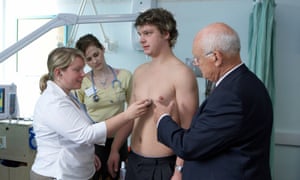
icture the scene. You’re wandering around an unfamiliar town late at night, unsure of where to go and feeling lost. But you’re in no fit state to follow complex directions, especially when they’re delivered at breakneck speed in a foreign language. Oh, and you’re in a wheelchair.
You’d be forgiven for thinking I’m describing the end of an adventurous night out abroad involving clubs, beer and general hedonism. But replace these with “hospital”, “nil by mouth” and “tedium” and you get a better idea of how my night actually panned out.
The familiar surroundings of the ward felt like an old, if slightly unwelcome, friend. Fortunately I didn’t have to renew my acquaintance with my other buddy, Mr Operating Theatre.
After wallowing in some self-pity, I decided upon a strategy that I often employ as an Aston Villa supporter – I consoled myself with the thought that at least some other people must be in the same boat.
Unfortunately, it’s not uncommon for students to find themselves in medical difficulties abroad.
While working at the Sorbonne after graduating from Hull University, Daniel Crutchfield was diagnosed with a tumour. He speaks highly of the care he received in France, saying “the system was very efficient”.
But he did encounter problems: “Nobody knew how to deal with me administratively.” I can identify with Daniel’s experiences. The care I received was fantastic, but being asked to guess my weight was a low point.
In a vain summer-time attempt to convince myself I was well prepared for my year abroad, I did the only sensible thing in such circumstances by making a list of what to take. A couple of days before I left, my parents suggested that along with my EHIC card, I should take a copy of my university insurance policy. It proved to have been very sound advice.
Louise Glover’s treatment in a private Moscow hospital is a case in point. Louise, a student at the University of Birmingham, says: “The surgeon wouldn’t do anything without proof of medical insurance, but there was no language barrier as all staff had to speak English.”
In my case, most staff didn’t speak English, which at least gave me the opportunity to learn some valuable medical vocabulary in both German and Italian – although, having to maintain a coherent conversation with my German anaesthetist while he searched for a vein wasn’t exactly how I’d imagined using my language skills in “real-life situations”.
Being in hospital nevertheless enabled me to catch up on the Serie A highlights and some bizarre Italian quiz shows. But the Cuban hospital that Helen Ward, a student at the University of Manchester, stayed in wasn’t so modern: “I felt like I was trapped in the 1960s, although everything was efficient, clean and free with my resident’s card.”
So how can you best prepare for an unscheduled trip to a foreign hospital?
- Make sure you’re insured and have the documents to prove it. If you’re travelling abroad as part of your degree, most universities will provide travel insurance to cover you in case of medical emergencies, but check with your university before travelling. Newcastle University, for example, has devised an ingenious way to keep important information safe. “We give all students an electronic wristband containing all relevant information in an emergency,” says Craig Langstaff, the university’s assistant insurance officer. But beware: most universities will only cover you during your placement and not for any post-year abroad adventures. If your travelling isn’t connected to university, arrange private insurance.
- Don’t be afraid to seek medical help. I was initially reluctant to go to hospital but if I hadn’t, the situation would have been far worse. If in doubt, it’s better to go than to have complications later on.
- Always ask if you’re unsure about something. I’m sure that I sounded ridiculous when I asked whether surgery was really necessary for the third time, but at least there was no ambiguity.
- Let someone know where you are. No one can help you if they don’t know you’re in hospital. If possible, take someone with you for moral support. Friends can also be useful on a practical level by phoning relevant people if you’re in no fit state to do so.
- Do your research. Know where the nearest hospital is and how to get there, even in the dark, and have local emergency numbers stored in your phone. You never know when they might come in useful.
As I left the hospital, the nurses said that they hoped they wouldn’t see me again. As efficient as the hospital was, I was quick to echo their thoughts.
I’m hoping that any future visits will be limited to sampling the delicious tiramisu in the café. Mr Operating Theatre and I need some time apart to re-evaluate our relationship.
[Source:- Gurdian]




